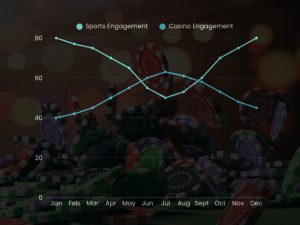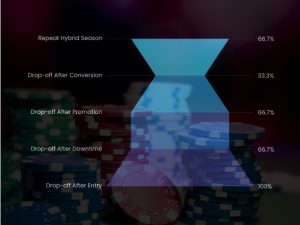What sports bettors do between matches: eploring casino gameplay during downtime
When the whistle blows, the action doesn’t stop. Across global markets, sports bettors are increasingly shifting into casino play during match breaks and off-seasons, and CasinoRank’s latest insights confirm this shift is accelerating. For operators, this downtime is emerging as a significant opportunity to extend engagement, diversify revenue and build hybrid player bases with higher lifetime value.
Industry leaders increasingly recognise this behaviour not as a marginal trend, but as a structural shift in player journeys. Cross-sell strategies are proving effective in reducing churn, smoothing seasonal revenue volatility, and strengthening brand loyalty. Those who treat this behaviour as a growth engine, rather than a side effect, are already seeing measurable returns.
Market Dynamics: From Bettors to Hybrid Players
The hybrid player, one who engages with both sportsbook and casino products, is now a defining feature of the iGaming landscape.
H2 Gambling Capital reports that over 40% of sports bettors play at a casino at least once per week. In Europe, hybrid players contribute close to 30% of casino revenue in mature markets. In Brazil, where mobile-first usage dominates, cross-sell conversion rates can exceed 35%. In India, downtime often leads to traditional formats such as Teen Patti and roulette during cricket breaks, whereas in Germany, strict regulations keep conversion rates closer to 15–20%.
The commercial implications are significant. Hybrid players typically deliver 45–55% higher ARPU than single-vertical bettors and demonstrate lower churn. Market analysis shows that operators who actively cultivate this segment are building more resilient and profitable player bases.
This chart illustrates how cross-sell conversion rates vary across key markets, with Brazil leading at nearly 38% and Germany trailing at under 18%, highlighting the importance of tailored regional strategies.
Data-Driven Insights: Understanding Player Behaviour
Patterns in hybrid play are now well established. EGBA’s 2024 analysis indicates that 42% of bettors switch to casino play during halftime or between fixtures, with average sessions lasting between six and nine minutes. These behaviours favour short, high-intensity formats: crash games, quick-spin slots, and instant-win titles.
The financial impact is clear. Evidence suggests hybrid players generate significantly higher ARPU, while operators report churn reductions of around 12% when both verticals are integrated into the player journey. Seasonal shifts reinforce casino’s stabilising role: during off-seasons in European football, as many as 70% of active bettors remain engaged through casino play.

This chart illustrates seasonal engagement shifts, showing sports activity peaking during main seasons while casino play rises in the off-season, underscoring the opportunity to balance player engagement year-round.
The Three Pillars of Cross-Sell Success
Industry leaders consistently point to three factors that separate successful cross-sell strategies from ineffective ones.
Personalisation and Timing
Market experience shows that generic campaigns rarely resonate. Leading operators are turning to AI-driven recommendations and real-time triggers linked to live match events or bet settlements. These approaches ensure relevance, which is proving decisive in driving uptake.
Seamless Experience
Friction remains one of the biggest barriers to cross-sell. Best practices include deploying single-wallet systems, unified loyalty programs, and streamlined transitions between sportsbook and casino apps. Operators who deliver this integration see higher engagement and repeat play.
Content Fit
Sports bettors tend to seek short-session formats that align with the pace of sports viewing. Crash games in Brazil, live dealer formats in the Nordics, and culturally familiar table games in India are all examples of where aligning casino content to behavioural context yields results.

This chart illustrates the cross-sell funnel, where significant drop-offs occur after entry (30%) and promotions (20%), while 20% of players transition to repeat hybrid sessions, highlighting the need for funnel optimisation.
Regional Examples: Learning from Market Leaders
Several operators have already demonstrated the commercial value of well-executed cross-sell strategies. In the UK, a leading multi-vertical brand reported a 32% uplift in casino revenue after introducing personalised halftime offers tied to live bettor activity. The success came not from more promotions but from precision: delivering relevant offers at the exact moment of highest receptivity.
Brazil illustrates the power of aligning content with culture. Operators who leaned into crash games and mobile-optimised casino formats achieved conversion rates above 35%, far surpassing European averages. Their success highlights how tailoring content to market habits can turn downtime into sustained engagement.
These examples suggest that the operators seeing the strongest returns are those treating cross-sell as a contextualised engagement strategy rather than a blanket marketing push.
Implementation Challenges and Solutions
Despite the upside, execution is complex. Regulatory frameworks are among the biggest constraints. The UKGC tightly limits inducements and requires robust responsible gambling controls. Germany’s Interstate Treaty enforces deposit and stake caps that restrict growth. Brazil’s evolving environment demands flexible compliance systems capable of adapting quickly.
Best practices emerging from the market emphasise the importance of cross-functional teams that integrate sportsbook, casino, UX, and compliance expertise. Agile rollouts allow strategies to be tested and refined in real time, reducing risk and improving outcomes. Above all, industry leaders note that compliance must be built in from the outset, not retrofitted after the fact. Operators who neglect this are discovering that reputational and regulatory costs can outweigh any short-term revenue gains.
Strategic Recommendations
The evidence is mounting: hybrid play is now central to the economics of iGaming. Operators who succeed are those embedding cross-sell into their core strategy rather than treating it as ancillary.
Successful frameworks consistently involve AI-powered personalisation to enhance timing and relevance, mobile-first design to accommodate short-session play, and single-wallet systems that reduce friction while reinforcing loyalty. Regional adaptation is also key, as cultural preferences in markets such as Brazil or India differ markedly from those in Germany or the UK.
Operators who position cross-sell in this way are not only reducing volatility but also future-proofing their business models. Industry leaders emphasise that the real competitive edge comes from balancing commercial opportunity with responsible execution, ensuring that growth strategies remain both sustainable and compliant.
For a deeper exploration of this opportunity, explore the full analysis on how downtime engagement is being transformed into sustained casino growth.
Conclusion
Sports bettors’ downtime is emerging as one of the most underleveraged growth channels in iGaming. Data shows that players want quick, engaging experiences between matches, and operators who can deliver this in a seamless, contextualised, and compliant way are setting new performance benchmarks.
Cross-selling is no longer optional. The hybrid player is becoming the norm, and those who recognise and adapt to this reality are already shaping the future of the industry.
The lesson from market leaders is clear: downtime is not space, it is casino time, and operators who optimise this moment are the ones who will define iGaming’s growth trajectory in 2025 and beyond.
No Comments